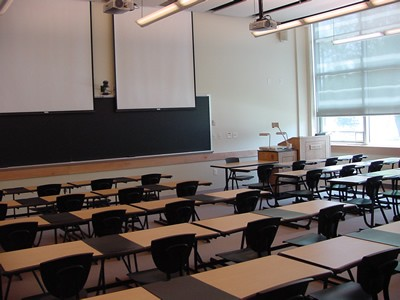Rethinking individualism
Say you walk into a building at which you’re employed. You feel businesslike – coat, computer bag over shoulder, maybe a cup of coffee or tea in hand. Others look similar and climb into the elevator with you. Buttons are pressed.
 Your eyes venture, but never into other eyes. Stainless steel walls in this contraption affirm your businesslike presence. At this point, are you not just an extension of these mechanisms with which you interact and rely on just to begin a day of productivity?
Your eyes venture, but never into other eyes. Stainless steel walls in this contraption affirm your businesslike presence. At this point, are you not just an extension of these mechanisms with which you interact and rely on just to begin a day of productivity?
Then you salivate, swallow, cough. Others in the elevator pretend not to notice, but they do. Germs? Is that guy sick? Did he cover his mouth? Maybe you feel more human now.
Many of us leave the workplace each day only to catch up on television or hit a local bar. Either of those activities may make us feel alive but when the TV is turned off or the bar closed, most simply limp home to bed. This allows us to turn off further thought until the next morning, when the process repeats.
This type of “individualism” may ultimately lead to collectivism, because many of us want the same thing with different labels. For example, we believe the Polo socks, Banana Republic pants, and Claiborne shirt are enough to announce us as different, even while we herd into metal elevators and stroll over to our cubicle space.
From bodily functions to unplanned social interactions, we are human to the core. The lack of balance in our lives is embodied in that steel cage-like elevator and mindless job fit enough for a robot. We don’t try to fix what’s wrong with our processes – the ones that drive us each day to get up, shower, arrive at work dreary-eyed. That is human to a tee, and unfortunately it’s all too normal.
Most of the time we spend is on mindless work, and as a result, we lash out when we can in bursts – junk food, entertainment, the bar scene. It’s like an extension of modern-day education: you know you’re stuck in a building for eight hours (sound familiar?), but it doesn’t make you accept it any less because deep down, you feel passion in your life burning out.
Maybe when you’re young, you don’t feel it burning out in quite as pronounced a fashion, but there’s something off with eight hours of boredom day in, day out. That’s the reason children look forward to recess, and only resent authority more as they grow older and more intelligent. Even recess is regulated now. No physical contact was a big recess rule over twenty years ago; one hesitates to imagine what recess must be like in 2010.
In denying humanity from an early age, and over socializing the individual snowflakes we call our children, we create robots who are beaten into submission to do what they’re told, only to find that some of them are in fact individuals – more individual than we’ve planned.
These would be your shoot-em-up types, the ones that get sick of the mindless game and feel no opportunity at home or at school to lash out or be human – so if guns are nearby, why not end it in a blaze of glory? Unfortunately, options are limited at a young age, so lashing out involves a wide spectrum – not just conforming or shooting people.
 Diagnoses of ADD and ADHD have skyrocketed in recent years, but when you think about how much more careful most people are with issues of reproduction – not drinking wine, not doing anything to damage a fetus – it’s unlikely these are new chemical imbalances in chlidren manifesting themselves in the classroom. Education hasn’t changed significantly in over 50 years. So what’s new?
Diagnoses of ADD and ADHD have skyrocketed in recent years, but when you think about how much more careful most people are with issues of reproduction – not drinking wine, not doing anything to damage a fetus – it’s unlikely these are new chemical imbalances in chlidren manifesting themselves in the classroom. Education hasn’t changed significantly in over 50 years. So what’s new?
Perhaps its our evolving methodology about how to deal with children. We think back to individualism actually leading to collectivism, and it makes some more sense. Modern kids go into a classroom, many from different backgrounds and no real common cultural thread. Some are more tolerant of eight-hour work days at the ripe age of six years old, some not so much. Those who are not are treated as the special snowflakes they are with specialized instruction, individual time with the teacher so they can catch up to everyone else – and be the same as everyone else. If they continue to resist, they are labeled problem children, or worse, assigned “special education”.
Never mind that the material doesn’t change to suit different needs – and never mind that would be more useful: find the strengths of people and focus on those strengths, while addressing weaknesses.
Instead, we do what’s easy and label it as pandering to the individual student mind. All this despite the widening disconnect between parents who want education to be day care and education, and educators who want to get through the next school year without having to stash whiskey in their desks.
Tags: cognitive dissonance, consumerism, crowdism, individualism, multiculturalism, self-deception









